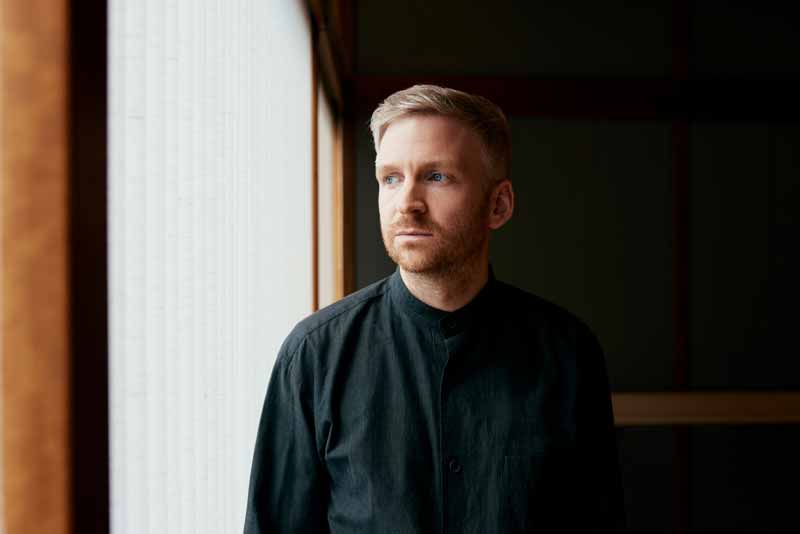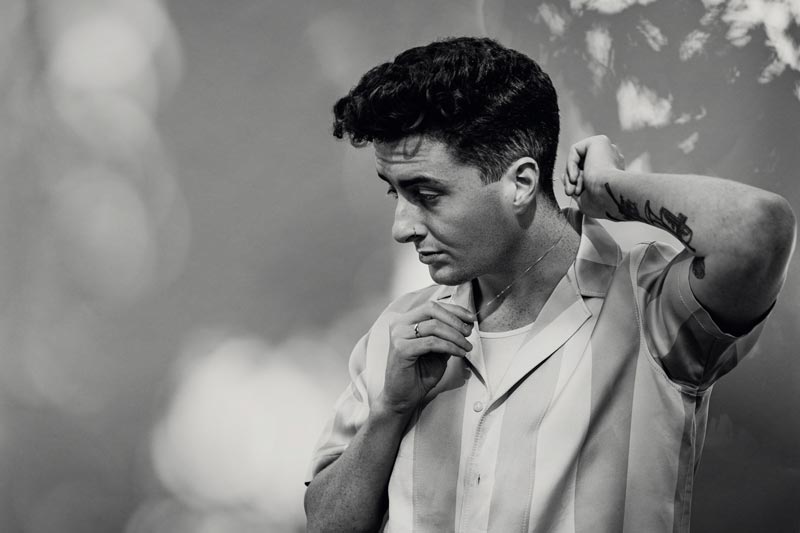Interview — Stephen Sanchez
»I feel like music should help you learn from each other«
With his emotive and soulful music, Stephen Sanchez takes his audience on a journey back in time to the 1950s and 1960s. Yet, the young musician from Nashville is anything but a sentimentalist who glorifies the past. We met him for an interview about his debut album »Angel Face,« about music that feels like a warm hug, and a time when non-white artists had to use music to make themselves heard in the face of adversity and pervasive racism.
22. September 2023 — Interview & text by Jonas Meyer, photography by Stefan Hobmaier

Nostalgia is a perilous emotion. We often gaze back with a certain melancholy at the apparent glory of days long past, yearning for the return of the good old times. Yet, all too willingly, we forget that the past was far from perfect – especially concerning the socio-political circumstances that meant injustice, lack of freedom, and oppression for many people.
But who can truly blame us for occasionally indulging in nostalgia? It’s also undeniably tempting. Consider the 1950s and 1960s, for instance: From today’s perspective, everything possessed a distinct style, particularly in terms of fashion. People wore elegant suits instead of sweatpants, enjoyed leisurely meals rather than fast food, and, when dating, had to make a physical approach instead of swiping through an app. And just think of all the music legends this era has produced!
So, how can we indulge in nostalgia without feeling guilty? Stephen Sanchez sets an example. Born in 2002 and raised in Sacramento, California, he unveiled his musical talent to the world about three years ago when he released his single “Lady by the Sea.” Almost overnight, it skyrocketed on TikTok, turning his life upside down in the blink of an eye. Even though Stephen’s music and demeanor are deeply rooted in the style of the fifties and sixties, he is simultaneously a representative of the present — a modern young man with a wholly unfiltered and reflective view of the world.
That this young man is a serious music artist and not just a fleeting social media phenomenon became clear, especially after none other than Sir Elton John declared himself as his advocate and fan. The British music icon, known for consistently nurturing young musicians, recently bestowed a distinct honor upon Stephen: On June 25th, during the final UK performance of his career, Elton John invited several guest stars onto the stage at the renowned Glastonbury Festival, and among them was Stephen Sanchez.
Originally, the plan was for the two to perform Elton’s song “I Guess That’s Why They Call It the Blues” together. But the pop giant made a spontaneous change. He wanted Stephen to play one of his own songs when inviting him onto the stage. Thus, the young man found himself performing his hit “Until I Found You” in front of a quarter of a million people.
Just a few days after this memorable performance and a couple of weeks prior to the release of his debut album “Angel Face,” we met the Stephen for an interview and a casual photoshoot at the headquarters of Universal Music Germany.


»Performing in front of so many people is something you don’t come down from quickly.«
MYP Magazine:
It was just three days ago that you were on stage with Elton John, performing in front of 250,000 people. How do you feel right now? Did you find it challenging to return to everyday life?
Stephen Sanchez:
I’m still buzzing from that experience and riding a high. Performing in front of so many people is something you don’t come down from quickly. I’m a person who can’t wait to get out and play shows anyway, but that experience has made me even more excited for the upcoming things — by which I mean the release of my debut record and a big tour for my band and me.
MYP Magazine:
What does it mean to you when someone like Elton John — an artist who has achieved everything in the music business — supports young musicians and talents like you?
Stephen Sanchez:
That gives me a lot of affirmation about what I’m doing. It makes me feel like I can do anything. Even though there are people in my personal life who make me feel like I could achieve anything, it’s pretty amazing to have someone like him champion me. I mean, Elton John is a hero, a music industry icon who has had a career spanning half the past century. I’m very grateful that such a person appreciates the music I’ve created, even though he doesn’t really know me. And by the way: I’ve never heard of Elton bringing anybody out to sing their own song in the middle of a set. That’s just incredible.

»I do feel a bit of pressure, but it’s not a pressure I’m afraid of.«
MYP Magazine:
In September, you are going to release your first album. Do you feel any pressure now that half the world already seems to be celebrating your music?
Stephen Sanchez:
I do feel a bit of pressure, but it’s not a pressure I’m afraid of, actually. I mean, the music industry is extremely different now. There are a lot of artists in their twenties with access to creating music. Whether they are really great or really bad, it’s kind of hard to push your own project through all the mess and be recognized as something truly great. So, I don’t feel weird. I feel like I’m exactly where I’m supposed to be. Putting this record out could be an amazing thing to watch happen.

»Having music that people can sit down and listen to all the way through, and find meaning in it at the end, is crucial.«
MYP Magazine:
What does it even mean to release an album with 13 tracks in the age of Instagram and TikTok, where sometimes only seconds decide about the success or failure of a single song?
Stephen Sanchez:
It’s exciting for me because this new record is a conceptual album. There’s a story to it, there are characters to it, and I think that makes it more digestible. Each song can stand on its own and speak for itself. It doesn’t rely on other songs to be great. I believe there’s importance in that. Having music that people can sit down and listen to all the way through, and find meaning in it at the end, is crucial — and that’s hopefully the same with my record. I think the world needs more of that because it truly helps. Just like when you watch a movie, you immerse yourself in the character’s shoes, feelings, experiences, and circumstances. It’s important for self-reflection on your own life: Ideally a movie helps you to see your own and understand yourself — and music functions the same way.
»Movies serve as a catalyst for evoking memories, which is wonderful because the same applies to music.«
MYP Magazine:
Movies are a good keyword. When listening to your music, it often feels like being immersed in a film scene, such as with the song “Death of the Troubadour,” characterized by a distinctive cowboy-Western sound. What role does Hollywood culture play for you when you’re crafting songs?
Stephen Sanchez:
I believe movie culture, in general, helps me bring out my emotions. I tend to watch movies that remind me of someone because I’ve watched those films with them. It’s like they trigger those memories. Then, later on, I can revisit those memories and write about them because they’ve been on my mind all day, you know? So, I think movies certainly serve as a catalyst for evoking memories, which is wonderful because the same applies to music. Everything is tied to memories. I can definitely say that certain movies have influenced my songwriting to some extent. However, I consider them as non-specific influences that remind me of someone I care about — no more, but no less.


»I feel like the music of the fifties and sixties was written for the future.«
MYP Magazine:
Your music and style evoke associations with a bygone era of music history. What particularly captivates you about the pop culture of the 1950 and 1960s?
Stephen Sanchez:
I feel like the music of the fifties and sixties was written for the future. It’s so timeless and still so universal because it’s riding on one concept, which is, for example, “I’ve lost her,” “my heart’s broken”, “I love her and I’m going to keep loving her,” or “I was a fool for you and now I don’t know what to do.” Or simply said: themes that are universally digestible.
To me, this music is so special because it’s straightforward. It doesn’t try to be dirty, provocative, or showy. It’s simple and direct, like saying, “I’ve made a mistake and I still love you.” There’s a beauty in that simplicity. Even in moments of struggle, there’s a certain elegance. For instance, Patsy Cline’s song “Walking After Midnight” is about her searching for her drunk husband after midnight and bringing him home as he cries over her. It’s incredibly powerful. I adore this straightforwardness; it holds a deep richness within its simplicity.

»Artists like Elton John still add value to the industry — and to society.«
MYP Magazine:
When this music was written about the future, would you say that today’s music is written about the past?
Stephen Sanchez:
Hmm, that’s an intriguing question. Maybe. Or it might be that this music is needed now because of its simplicity and the deep layers present in its songwriting. It’s almost like a blueprint for certain things, like how to love someone, how to apologize sincerely.
Nowadays, there doesn’t seem to be as much coherence in music. There isn’t much that’s significantly contributing to the world in a novel way, something that hasn’t been experienced to some extent already. You know, the music that has existed continues to contribute because it’s ingrained in our culture, like the music of the fifties, sixties, and rock and roll. Artists like Elton John still add value to the industry — and to society. However, we’re currently in an era of rapid releases, often filled with explicit content, drugs, or violence. It’s not really about laying a foundation, about showcasing the essence of being human and how to connect with each other. It mostly reflects what’s already present, lacking profound depth.
MYP Magazine:
Would you say we’ve lost focus?
Stephen Sanchez:
Yeah, definitely. I feel like music should teach you something. It should help you learn from each other and bring yourself closer to one another. Even though music in general has always done that, I think more and more often we just rely on the hype that is made about some things.

»We still have much to improve as a society.«
MYP Magazine:
On you Instagram page you say: “Welcome to 1964!” What were the strengths and weaknesses of that time? Or to phrase it differently: What do you miss from the sixties in today’s world? And what aspects of that period are you glad we left behind?
Stephen Sanchez:
Well, obviously, misogyny stands out as a significant issue. Unfortunately, racism continues to persist widely, and misogyny still exists to some extent. However, during that period, these negative aspects were deeply ingrained and normalized. Today, there’s at least an acknowledgment and a pushback against misogyny and racism in our culture. That’s a positive development. Yet, we still have much to improve as a society. It’s encouraging that these issues are no longer as accepted in mainstream American culture, but as long as they still exist, we have a considerable amount of work ahead of us.
MYP Magazine:
In 2020 you moved to Nashville. Why is it important for you as a young musician of the digital age to be physically on the spot?
Stephen Sanchez: (smiles)
It was kind of an accident, to be honest. I couldn’t afford to live in New York or L.A. back then, and my parents were moving to Nashville. Additionally, I had friends already in the city. So, things naturally led me there. I believe it’s a fantastic music community with wonderful people and artists who are truly inspiring — and who genuinely support each other instead of getting caught up in egos. Everyone’s focused on being there for one another, and that’s heartwarming. I’ve gained a lot from being in that environment.

»I’m drawn to that aspect of nostalgia — witnessing people using music to regain their voices in the face of adversity.«
MYP Magazine:
In the United States, we are currently witnessing a society divided between those who aim to preserve the past and those advocating for socio-political progress. Does it bother you that some factions of society manipulate the term “nostalgia” to further their own agendas?
Stephen Sanchez:
When I experience nostalgia, it’s for the positive aspects of that era, such as the cars, music, and rock and roll. I appreciate these elements because they hold significance. I also find inspiration in artists from that time, especially African-Americans who used music as a means of expression, given their voices were suppressed due to the pervasive racism in America. It was more than just creating love songs; it was a way of life. I’m drawn to that aspect of nostalgia — witnessing people using music to regain their voices in the face of adversity. That’s what matters to me.
So, I can only share my perspective and can’t speak for others as I am not in their shoes. However, anyone who promotes divisiveness and mistreats another culture due to personal preferences is, in my view, in the wrong. I believe in unity, and I feel like we should all come together as a society.

»If I were ever to lose someone, the music would be the outcome.«
MYP Magazine:
It seems that there is often a certain melancholy to your music. Do you consider yourself a melancholic person?
Stephen Sanchez:
Um, to some extent, I believe so. I think romance embraces both sides of the spectrum. I consider myself a strong romantic, and within that, there’s a sense of hopelessness as well as hopefulness. These two aspects constantly compete. So, I believe there’s undoubtedly a touch of melancholy in all things I’ve composed and sung about. However, there’s always a counterbalance. For instance, if I were ever to lose someone, the music would be the outcome. I can confidently say that.

»Love demands hard and substantial effort because human beings are complex.
MYP Magazine:
In the song “No One Knows” you sing: “No one knows the trouble, honey, that we’ve been through.” Are you someone who prefers to deal with heartbreak and relationship problems with yourself?
Stephen Sanchez:
Obviously, “Until I Found You” is about a specific person. I wrote that song when I was 18 while I was going through the breakup. However, if I were to be in a relationship now and faced a breakup, I would keep the details within the both of us. They wouldn’t spill out into the public space. Yet, in writing songs like that, I aim to convey that love can be challenging. It’s not always a simple case of instant puppy love. Love demands hard and substantial effort because human beings are complex.
Nevertheless, the outcome of this hard work is something incredibly beautiful — a healthy and happy relationship with someone who truly understands and sees you. I believe unless you navigate through difficulties and reveal your less-than-perfect self to someone, you discover that you’re not so different after all. You learn to love and appreciate those aspects of each other, wanting to comprehend and embrace the full spectrum rather than just the surface-level affection. So, in songs like “No One Knows,” the lyrics express a dual sentiment: “I love you, but also I struggle with these aspects of you.” The message is about choosing to accept both the flaws and the strengths of a person and of oneself, seeing them as equally valuable. Everyone should love both of those things as if they were the best.

»Love is about deciding on something and sticking with it.«
MYP Magazine:
Your music extensively explores the theme of love. Would you argue that this topic is the primary reason for the existence of music itself?
Stephen Sanchez:
Absolutely! I believe it’s about the pursuit of something, and love represents that pursuit. However, this concept isn’t confined solely to romantic love. It includes many more facets. If we consider love as a pursuit, then it’s the pursuit of one’s identity, one’s independence, one’s self-expression. Love manifests in all these aspects. It’s not limited to romantic relationships; it can revolve around countless other subjects. Whether it’s directed at a person, an object like a car or a home, or even the act of going out and having fun. (smiles) It’s quite profound, really. I mean, everything is pretty much a love song just to a degree — because love is about deciding on something and sticking with it.
»The idea of being homeward bound resonates deeply with me. It’s like a big warm hug.«
MYP Magazine:
What music can you personally escape to when you need a big hug?
Stephen Sanchez: (laughs)
Oh, man! A hug?!
MYP Magazine:
Isn’t that what music is all about? Being hugged?
Stephen Sanchez:
Yeah, well, I really love that, I’ve never really thought of it in that perspective before. Lately, I’ve been quite drawn to artists like Glen Campbell and Cat Stevens — artists with a comforting and hugging singer-songwriter style. I also just have to think of the song “Homeward Bound” by Simon & Garfunkel. It’s about yearning to return home, reflecting on one-night stands in various cities while on tour. The song captures the feeling of transience and the desire for a deeper connection. The idea of being homeward bound, going back to the person you love, resonates deeply with me. It’s like a big warm hug. Any song that revolves around this theme exudes a sense of comfort and tenderness in my opinion. The thought of heading back, all by yourself, evokes the feeling of a warm embrace as it brings to mind thinking about someone special.

»I’m now much better at expressing my love for someone outside of the musical world.«
MYP Magazine:
What would you say you can you express through your music that you can’t convey in an ordinary conversation?
Stephen Sanchez:
I feel like I’ve gotten better at expressing my feelings. When I was younger, I was using music for that. As I’ve met people in my life, such as the guys in the band and someone very dear to me, they’ve shown me that it’s totally okay to express your emotions and to experience them deeply. This was something I lacked while growing up; I didn’t have that sense of emotional security. Now, I find myself capable of communicating clearly.
In essence, I’m a blend of both. I find it more exquisite to sing a love song and let my emotions flow through music. It’s definitely my preferred method. However, I think I’m now much better at expressing my love for someone outside of the musical world. It’s a more profound form of connection. Yet, music remains a powerful means of expression, a very significant one, and it’s still my favorite.

With special thanks to David Groß from Universal Music Germany for his empathy, patience, and weeks-long efforts.
Sometimes it’s those outside the spotlight who shine the brightest…
More about Stephen Sanchez:
Interview and text by Jonas Meyer:
Photography by Stefan Hobmaier:

















